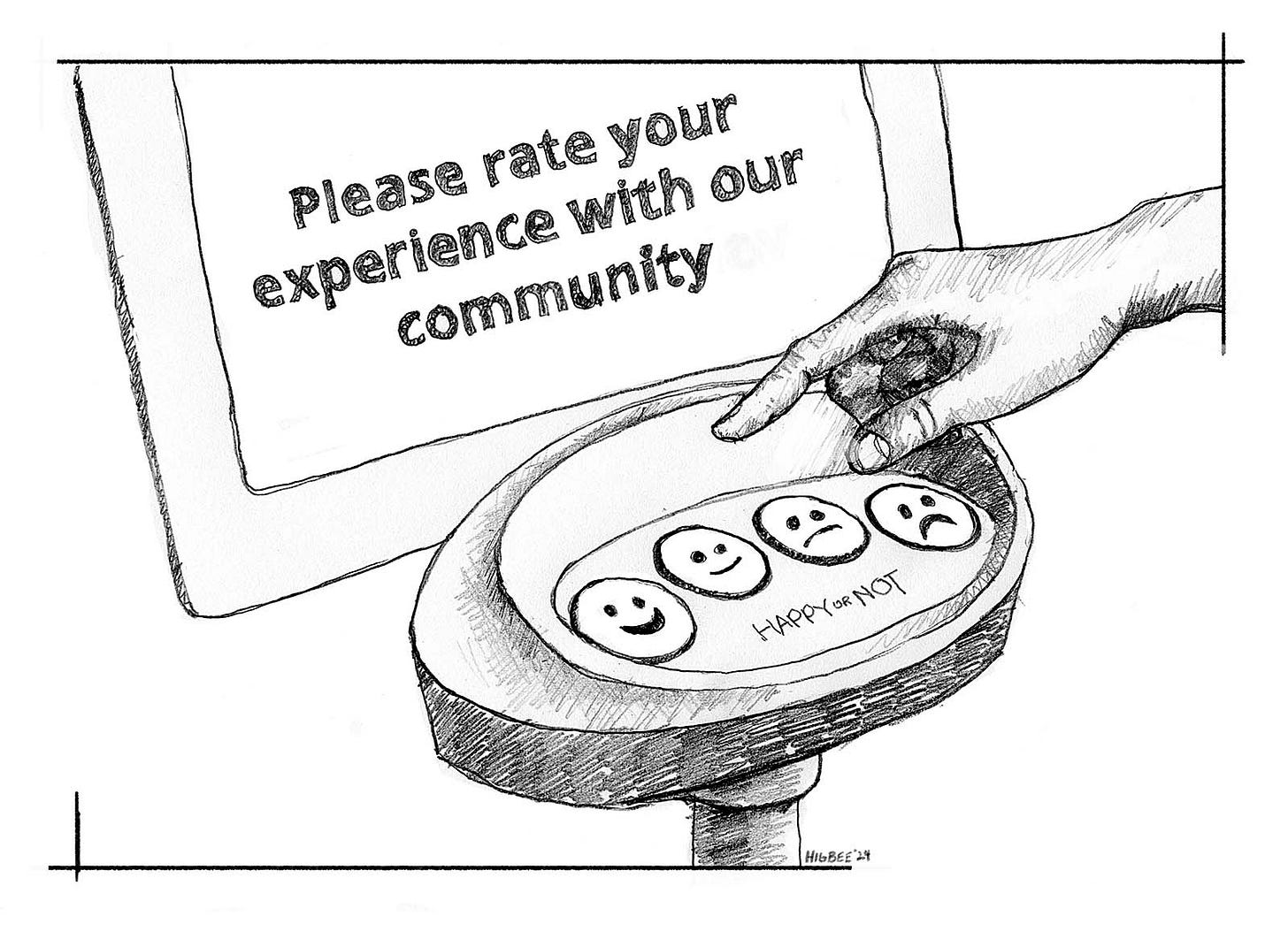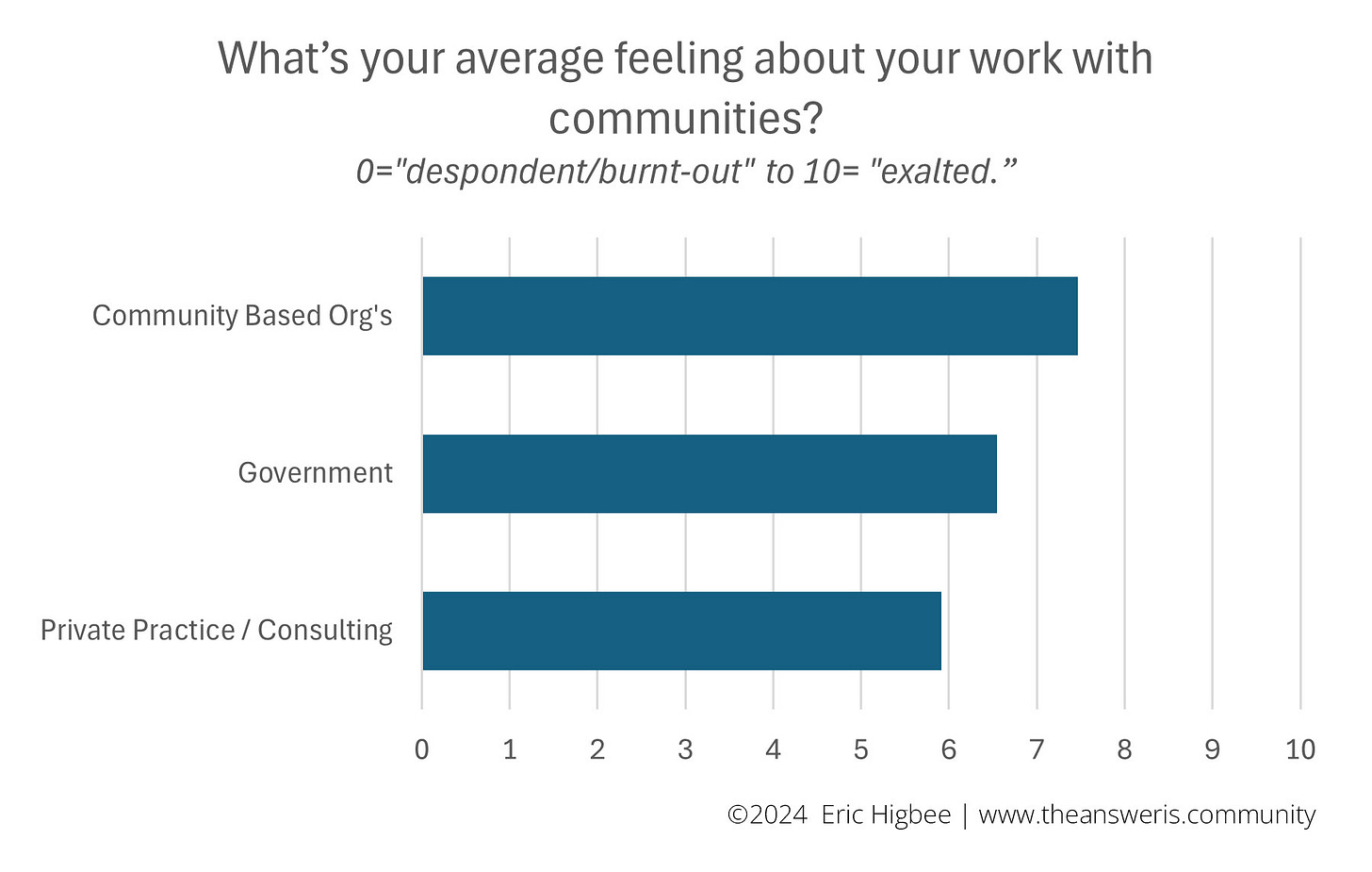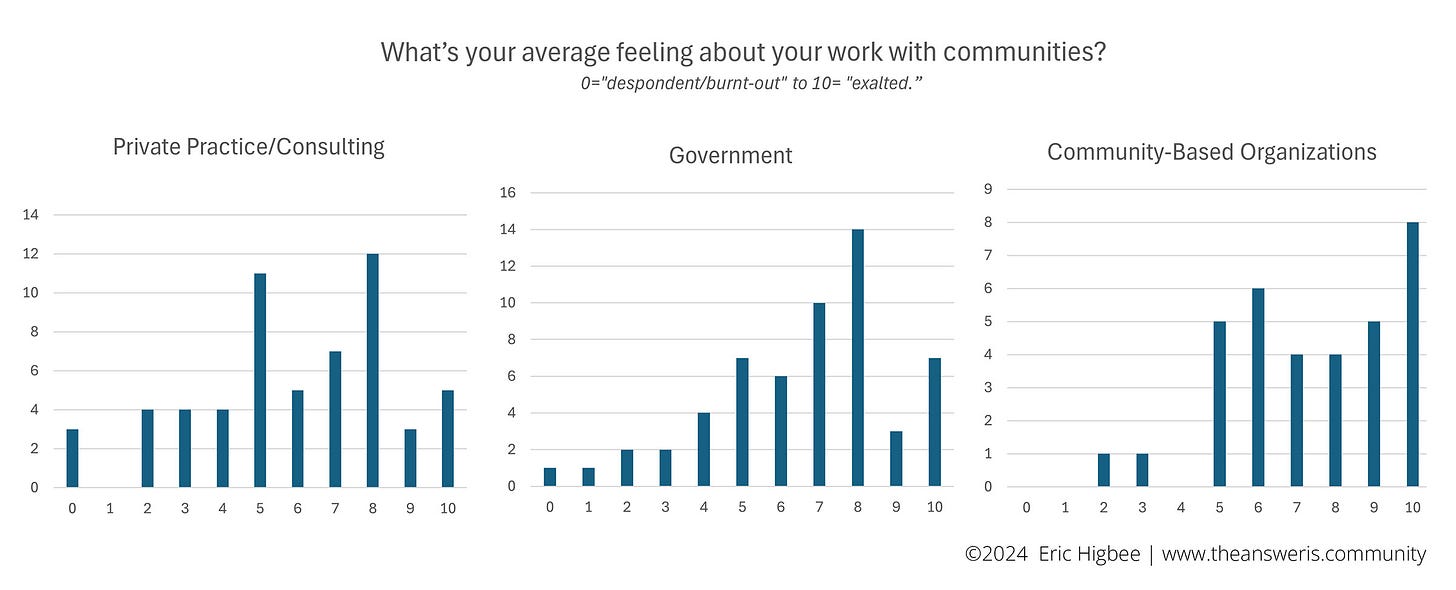Exalted? Despondent? How folks feel about their community work.
As reported by engagement practitioners in the Survey on Community Engagement (Reading Time: 3.5 minutes)
I talk to a lot of people about their community engagement practice. And there are some currents running through their stories.
For those in private practice, I hear frustration about the limits of project-based for-profit work. Practitioners enjoy working with communities, but never feel like the time or resources for deeper community building is baked into their contracts.
For those in government, I hear similar frustrations but with an extra dose of bitterness. Local governments are the front-line of democracy and it hasn’t been easy sledding recently. Public decision-making processes are increasingly going off the rails in our culturally atomized society. Folks are getting burnt out and abused.
It seems like both groups are endeavoring for purpose and support within an increasingly transactional field of practice.
All the while, I hear from community-based organizations who are passionate about their work, but struggle against a relentless tide of burnout and inconsistent funding.
Are these stories reflective of all practitioners, or just some selective bias on my part? I wanted to find out.
So let’s return to my Survey of Community Engagement.
This will be my last post on the Survey. Over the last few months, we’ve been using it as a launchpad to explore the tension between community engagement and community building. For example, we’ve asked:
One of the last questions in the survey was, “What’s your average feeling about your work with communities?” Respondents could answer using a slider ranked from "0=despondent/burnt-out” to “10=exalted.”
Here’s the average results divided by the three categories of respondent groups.
Here’s the same data in a little more detail because average results can sometimes be deceiving. Did you hear about the statistician who drowned in a lake averaging two feet deep? LOL!
What do you see?
Despite soundtracks of sad strings accompanying my conversations with engagement practitioners, the positives of working with communities seem to still outweigh the negatives.
Or perhaps the question was simply too general to capture the nuance of doing community engagement in today’s world. This was reflected in one comment I heard from an urban planner from Washington State:
“I am exalted when I get to have meaningful one-on-one conversations with community members and learn about their concerns in greater detail; I am burnt out by the level of effort it takes to convince leadership of the value of real community engagement.”
A few more comments from the survey, slightly edited for clarity:
“I love when I get a chance to work with communities, even when I wish I could do more. It is when the projects can't find funding, get shelved, or there’s poor maintenance that they don’t support the community vision, and that causes burnout and despondency.“ - Landscape Architect from CA
“Working with whiter communities in Washington is hard for me, especially when their response to additional housing often has racist undertones. I don't always feel safe doing engagement in all of the towns we work for.” - Planning Consultant from WA
“I am excited about the work that my team and I are doing, but I am burned out on trying to convince the larger community to care about getting engaged. I've spent years trying to get people excited, and it doesn't work. I am much more interested in investing in supporting our [local] businesses and our organization to survive this tough economy/society right now, so that when people are ready to reengage with building a community, we will be there to meet them.” - Non-profit leader in WA
So there you have it.
How do you feel about your community engagement work? Do these survey results reflect what you hear from other practitioners?
See those “comment” buttons on the top and bottom of this email or post? I would love to hear your take. Substack has a nice interface for comments. Maybe we can get a discussion going?
PPS. I would also love your support with a click of the “heart” button too! Anyone get this far in this post? Is there anybody out there? Let me know you like this!
LOOKING FOR STORIES TO SHARE
Do you have a great example of how a community engagement process helped a community restitch is fraying social fabric, or go from “Us vs Them” to “We.” I’d love to talk to you. Please reach out.
WHAT ELSE I’M READING
How to Fix DEI by Rachel Kleinfeld in Pursuasion:
Kleinfeld’s solutions for DEI reflect the solutions for community engagement that I espouse here: we pave a path towards a pluralistic democracy with strategies from social contact theory. Check it out.
Civic Perceptions Project by PACE
Earlier this year, the Philanthropy for Active Civic Engagement (PACE) released the latest results from its Civic Perceptions Project. PACE is trying to understand how people perceive the language associated with civic and engagement work. As an author who writes about these issues, I found their insights fascinating. Which words resonate the most? Freedom? Community? Belonging?
I’m looking forward to learning more in their upcoming October 16th webinar, “How to Talk Bridgey.”







